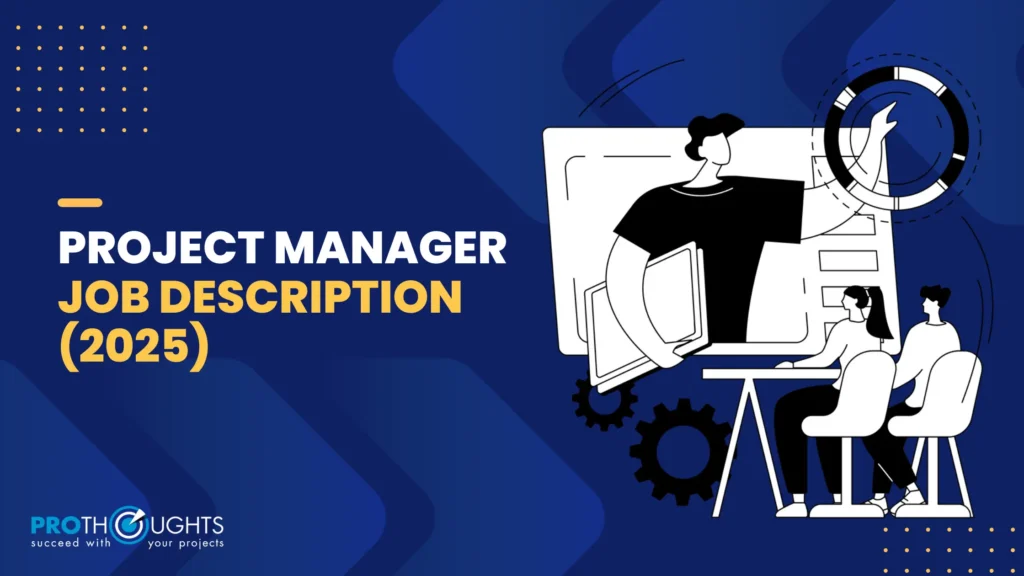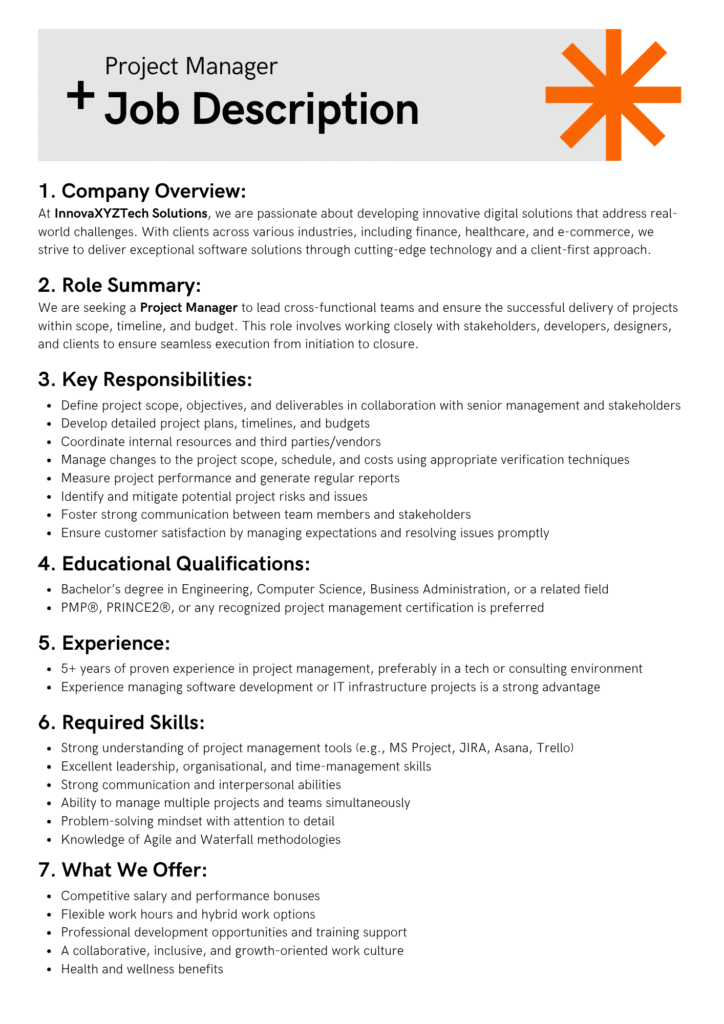
What exactly does a project manager do, and how should a project manager job description reflect that? Most hiring teams have to answer that question; similarly, even candidates frequently ponder over the long lists of duties and expectations mentioned in the project manager job description.
From planning and communication to problem-solving and team coordination, a project manager wears many hats. But crafting a compelling project manager job description takes more than just listing skills. It requires clarity, precision, and the right language to attract the best-fit candidate.
Whether you are looking to hire a project manager or step into the role yourself, this blog breaks down the essential elements of the project manager job description to make things easier. Read Along!
Project Manager Job Description: What You Need to Know?
A project manager job description explains the key roles and responsibilities of a project manager who takes charge of a project from start to finish. Furthermore, it includes planning, assigning tasks, managing time and budget, and keeping everything and everyone in order.
Hence, knowing this helps you understand how projects are handled in real life and why strong leadership is needed to get work done well and on time.
What is a Project Manager?
A person responsible for overseeing the project from start to finish is called a project manager. Their role is to ensure the project’s goals are achieved while balancing time, budget, resources, and quality.
In many industries, such as healthcare and finance, a project manager is essential for developing ideas into organized and profitable outcomes. They provide value through the projects by building the right team, aligning the procedures, and sourcing the correct equipment.
What does the Project Manager Job Description Really Cover?
A project manager has many responsibilities throughout the project. The project manager job description usually includes creating the project objectives, creating a project plan, allotting tasks to their team members, taking care of the budgets, and tracking the project’s progress. They are also expected to create better communication with the project stakeholders, look after and manage the risks attached to the execution of the project, give solutions to the problems, and motivate team members.
The project manager has to look after the better functioning of the project and ensure the project completes on time, runs smoothly, and meets client or customer expectations.
Project Manager Job Description Template
Project Manager Roles and Responsibilities
The project manager plays a very important role throughout the project’s lifecycle. They have several tasks and duties to manage and are proficient in ensuring that the project meets all of its objectives. The project manager job role typically includes the following responsibilities, which are outlined below:
-
Define the Project Scope
The project manager makes sure that everyone knows what the project aims to do and what needs to be delivered through the project. Project scope simply means understanding what the project will provide and what it won’t. It sets clear goals, outlines the work to be done, and helps everyone stay on the same page. This avoids confusion, keeps the team focused, and makes sure there are no surprises later.
-
Make The Project Plan
In this step, the project manager has to create a plan that shows what the next step is, who is going to perform it, and by what timeline it needs to be completed. This plan helps the team to stay on track and meet the deadlines set.
-
Resource Management
Resource management means making sure the right people, tools, time, and materials are used properly during the project. The project manager assigns tasks based on skills and availability and keeps an eye on how resources are used. This helps avoid delays and makes sure nothing goes to waste.
-
Budget Management
Handling and controlling the budget is always an important task. Project managers have to look at and plan the estimated cost and make sure that the project does not exceed the required budget. Furthermore, if there are any unexpected changes or risks arising, the project manager must be prepared to alter the financial plans.
-
Risk Management
The project manager must identify the risks that might appear while executing the project and need to create solutions for the risks detected. The project manager has to solve these problems before the issue aggravates. Risk Management is important so that the project doesn’t get out of hand because of any unforeseen events or risks.
-
Communication Management
Effective communication is considered the most important part of project management. The project manager must communicate well with their team, clients, and management on what is currently going on with the project, including its progress, or any hazards. This helps the team to stay on the right path throughout the project execution.
-
Quality Management
Project Managers are responsible for managing and providing quality results/products. They create quality bars, conduct regular checks, and make sure that the results match the necessary guidelines. To guarantee adherence to organizational or industry standards, this entails close project collaboration with quality control teams.
-
Monitoring and Reporting
The project manager oversees the performance of the project for which the plan has been created during the execution of the project. They look after the tasks, timelines, and overall performance using tools like Gantt charts and, critical path method, which help show task timelines and dependencies. To keep everyone on the same page and informed about deadlines, deliverables, and any necessary revisions, they keep an eye on key performance indicators (KPIs) and create progress reports.
-
Lead The Team
Leading the team is one of the important project manager qualities. They need to boost the morale of the team throughout the execution of the project. Boosting team spirit, resolving issues, creating a positive environment, and setting goals come under the purview of the project manager.
-
Close the Project
After the completion of the project, the project manager makes sure that the completion process is followed. It includes handing over the final work, releasing the team members, checking on how the project went, and jotting down what was learned. By doing this, it helps to prevent any future confusion and ensures future projects are better.
Project Manager Skills: Know What It Is
Knowing the roles and responsibilities is only one part of the picture. The project manager job description also mentions the skills that are important for achieving success in any specific role in the project management field. Having these skills helps in forming better decisions, managing the teams and risks, and improving the performance of the project. So let’s take a look at the project manager skills:
The skills included are:
1. Project Planning and Execution
Having experience in forming project goals, developing in-depth plans, and making sure to deliver successful results by managing scope, schedule, and quality effectively.
2. Budget and Cost Management
Proficient in preparing and managing project budgets, controlling costs, and ensuring financial efficiency without compromising quality or delivery.
3. Clear Communication
As discussed earlier, strong verbal and written communication skills are a must for a project manager to ensure clarity among stakeholders, teams, and clients, promoting transparency and alignment.
4. Stakeholder Management
Being capable of managing expectations, building trust, and maintaining regular engagement with clients, sponsors, and cross-functional teams.
5. Delegation
Expert in assigning the right tasks to the right team members, assuring productivity while encouraging ownership and accountability.
6. Team Leadership
Quality to motivate and lead various teams, solve conflicts, promote collaboration, and keep everyone positioned with project goals.
7. Agile and Waterfall Methodologies
Hands-on experience using Agile (Scrum, Kanban) and traditional Waterfall approaches, adapting methods to suit project needs.
8. Problem-Solving
Good and skillful at identifying what’s causing the problem and finding out the best solutions faster so that the project stays on track and teams are focused.
9. Risk and Issue Management
Identify potential risks, their impact, and proactively create plans to solve those problems and minimize the disruption that might cause in the future.
10. Strategic Thinking
Aligns project outcomes with business objectives, driving long-term value and making informed decisions that support organizational goals.
11. Time Management
Efficient at prioritizing tasks, managing deadlines, and making sure the project deliveries are on time, even under pressure.
12. Tools and Technology Proficiency
Having knowledge and experience with tools like MS Project, JIRA, Trello, or Asana to plan, monitor, and report progress seamlessly.
Popular Project Manager Certification
It is not a hidden fact that, to grow faster in the project management field, getting certified with the PMI certification is necessary. Having a certificate proves the knowledge and skills required for the job you are applying for. Below are some recognized certificates that most project manager opts for.
1. Project Management Professional
This is a world-recognized certification, and it proves your strength to lead and manage difficult projects effortlessly by using various methodologies. It covers areas like planning, execution, risk, and stakeholder management.
2. Agile Certified Practitioner
Those who work in Agile environments will find this qualification ideal. It focuses on flexibility and continuous delivery, covering Scrum, Kanban, Lean, and other frameworks.
3. Program Management Professional
PgMP, which aims at experienced managers, looks at your capacity to oversee several connected projects that are in line with corporate objectives. It works well for people who think strategically.
4. Portfolio Management Professional
This certification is for executives who manage project portfolios. It demonstrates your ability to align projects and programs with business strategy and maximize ROI.
5. Certified Associate in Project Management
Ideal for beginners, CAPM demonstrates your understanding of fundamental project management concepts and terminology. It’s a great stepping stone to PMP.
6. PRINCE2 Foundation/Practitioner
Widely used in the UK and internationally, PRINCE2 offers a structured approach to project management. It’s process-driven and focuses on clear roles, stages, and documentation.
7. Certified Scrum Master
Great for those managing Agile teams, CSM focuses on Scrum roles, ceremonies, and values. It’s beginner-friendly and helps you understand how to be an effective Scrum Master.
8. SAFe Agilist
Designed for managing Agile at scale, the SAFe Agile certification is ideal for leaders working with multiple Agile teams. It focuses on Lean principles, Agile architecture, and enterprise agility.
9. Six Sigma Green Belt / Black Belt
The Six Sigma Methodology certifications focus on process improvement and data-driven decision-making. Green Belt suits mid-level professionals, while Black Belt is for advanced leaders solving complex problems.
Conclusion
A well-made project manager job description can be a critical tool for both recruiters and aspiring managers. For the hiring manager, it sets clear expectations and attracts the right candidate with the necessary skills. For project managers, it outlines the key responsibilities, required level of proficiency, and credential factors associated with the role.
Understanding what the role demands is the first step. What comes next is preparing yourself for the next role. Now, there are multiple pathways to becoming a project manager, and one of the fastest and effective ways to upskill is through professional certifications.
At ProThoughts, we have helped over 10,000+ professionals globally advance their project management careers with our certification training programs. If you are looking to upskill, improve your profile, and land better opportunities, we are just a query away! Fill in the form on the screen, and we’ll be there to help you.
ProTip: A great project manager customizes their plan for every project, so why send the same resume everywhere? Tweak it for each job description to show you’ve read the brief and you’re ready to deliver.





